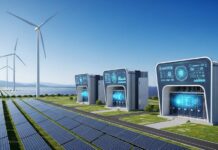The plan entails analysing and developing innovative solutions such as high-efficiency heat pumps in dryers and supplies of green energy in atomisers and hybrid ovens
Iberdrola and Porcelanosa have decided to join forces and work together on electrification projects for this industry, which will drive the decarbonisation of ceramic production in line with EU objectives and the fight against climate change.
The companies have agreed to conduct joint research into energy solutions for the ceramic firm’s plants, such as maximum efficiency, high-temperature heat pumps in driers, as well as the combined use of renewable energy and a green hydrogen supply to reach the temperatures required in atomisers and hybrid ovens.
This will help to drive the electrification of the ceramic company’s production process by improving energy efficiency and making use of residual heat.
Iberdrola will support Porcelanosa’s decarbonisation plan to the extent that energy solutions and consumption at the company’s plants will be improved by using sources of energy that do not produce CO2 emissions. The analysis will also include the installation of a self-consumption photovoltaic plant on the premises.
The energy company will also help to develop projects and the necessary engineering to support the execution of these innovative decarbonisation projects, which may also be eligible in calls for applications for European, national and regional public grants.
Green innovation to transform the industrial sector
Iberdrola is certain that the energy transition can be a driving force in the transformation of the industrial sector and for a green recovery in the economy and the job market. The company has thus launched an unprecedented investment plan worth €75 bn for the 2020-2025 period, with the aim of doubling its renewable capacity and taking advantage of the opportunities presented by the energy revolution faced by the world’s main economies.
Investments in Spain for the period amount to around €14.3 bn, half of which (more than €7 bn), will be spent developing new renewable energy projects, while more than 4.5 bn will go towards strengthening and digitalising its electricity grids.
After 20 years promoting the energy transition in Spain, Iberdrola leads in renewable energy in the country, with an installed renewable capacity exceeding 16,700 MW as of September 2020 – an amount that totals more than 35,000 MW worldwide, making its generation facilities among the cleanest in the energy sector.
Iberdrola manages more than 2,100 MW of installed renewable power in the Community of Valencia, where Europe’s largest pump station, its Cortes-La Muela complex, is its maximum exponent.
It is also making progress with the formalities required for its first photovoltaic projects in the region, to a total of 450 megawatts (MW) representing an investment of more than 230 million euros.
With CO2/kWh emissions already two thirds lower than the European average, the investment strategy in clean energy and grids will make Iberdrola a “carbon neutral” company in Europe by 2030.
































